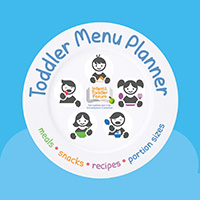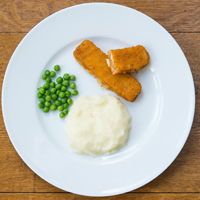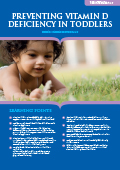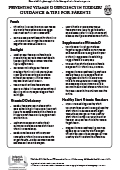
Use our Toddler Meal planning tool to ensure your 1-4 years old receives a balanced diet every day.
Find out more >
Use our toddler food tracker to check that your 1-4 year olds are getting a good balance of foods and activity
Find out more >
This educational programme for frontline professionals contains a range of practical resources on infant feeding.
Find out more >Guidance & Tips for Parents
Advice on preventing vitamin D deficiency and its health consequences.
Foods
- Vitamin D is found in only a few foods: oily fish is the only good source. Eggs and meat contain very small amounts
- Include oily fish in meals once or twice a week to increase dietary intake of vitamin D
- Some foods are fortified with vitamin D – formula milks, evaporated milk, margarine and some yogurts and breakfast cereals.
Sunlight
- Most of your toddler’s vitamin D is made in his/her skin when outside in the sunlight in the summer months (April-September)
- Sunscreen will stop your toddler making vitamin D in his/her skin so allow your toddler to play outside without sunscreen at times when he/she is unlikely to burn
- The amount of time toddlers can spend outside in the sunshine without burning will vary depending on their skin colour.
Vitamin D Deficiency
- Babies and toddlers in the UK more at risk of deficiency are those with mothers who had low vitamin D levels during pregnancy. This includes mothers who:
- did not take vitamin supplements during pregnancy
- have dark skins
- cover most of their skin when outside.
- Babies and toddlers with very low amounts of vitamin D could have fits or get rickets – a disease when bones become soft and misshapen
- Low vitamin D levels may make toddlers more likely to get diabetes, allergies, asthma and infectious diseases as they get older.
Supplements of Vitamin D
- Your toddler is not guaranteed to get enough vitamin D from foods and sunshine alone, so give him/her a vitamin supplement containing vitamins A and D every day
- The Healthy Start children’s vitamin drops contain vitamins A, C and D
- Pregnant and breastfeeding mothers should take a daily supplement of 10μg (400IU) vitamin D every day. This will ensure that your baby is born with sufficient stores of vitamin D for the first few months of life.
Healthy Start Vitamin Coupons
- If you are receiving Healthy Start vouchers then you will also get green Healthy Start vitamin coupons every eight weeks to exchange for free Healthy Start vitamin drops for for your infant or toddler. Ask your health visitor where to get them
- Pregnant and breastfeeding women signed up for Healthy Start also get green coupons to exchange for free Healthy Start tablets with vitamin D.




